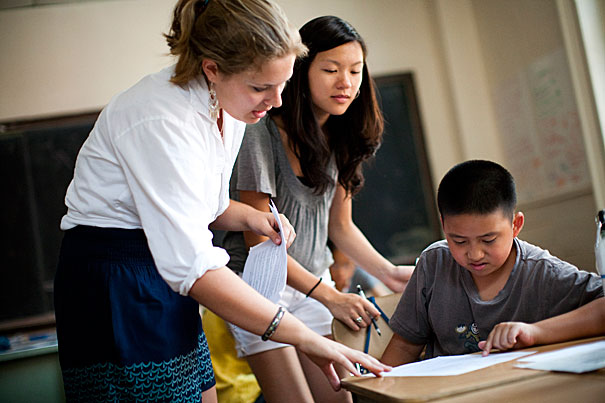
Abigail Bok (from left) and junior counselor Cindy Guan lead a class activity for campers. “I didn’t feel like I knew anyone here,” said Guan, 17, a senior at Boston Latin School who grew up in Chinatown and volunteers in the PBHA program there. “Doing the after-school program made me feel like I was a part of my community; it made me feel like I was giving back.”
File photo by Stephanie Mitchell/Harvard Staff Photographer
Beyond the school day
PBHA’s after-school programs keep the lessons coming
The end of the school day doesn’t mean the end of learning for Boston children and teens, thanks to after-school programs run by Harvard’s Phillips Brooks House Association (PBHA). For more than two decades, these programs have provided a safe and fun place for students to go in the crucial afternoon hours.
PBHA runs more than a dozen after-school programs for Boston children and teens, offering homework help, tutoring, mentoring, and enrichment. For many students, being involved with PBHA keeps them out of trouble, helps them complete their homework, and gives them an opportunity to extend their learning time beyond the school day.
“At home, my parents don’t speak English, and my older brother could only help me to a certain extent,” said Jorge Santana, 18, who started attending the Mission Hill After School Program (MHASP) when he was in the third grade and continued through high school. “PBHA gave me a one-on-one tutor who helped me learn English better and get my homework done.”
As part of MHASP and other PBHA after-school programs, students take field trips to Harvard and receive one-on-one mentoring and training from college students. That kind of interaction helped Santana set his sights on college, and moved him to be the kind of role model that had inspired him as a child. Now in his freshman year at Fitchburg State, he has spent the past three years working as a counselor in PBHA’s summer programs.
“Looking back, especially, I can see how it helped me,” he said. “Not everyone had that opportunity; I was lucky.”
Stanley Zheng, a Harvard junior who runs PBHA’s Chinatown Afterschool Program, said his own experiences growing up with two working parents in Philadelphia’s Chinatown motivated him to volunteer when he came to Harvard.
“Many of our students go through what I went through; they don’t have anyone to take care of them after school,” he said. “I remember when I was in the first grade and had to stay home alone after school because both of my parents worked … For our students, being here with someone who can sit down and read with them is a big thing.”
For Philip Chen, a 12-year-old seventh-grader at the Quincy Upper School, going to the Chinatown Afterschool Program means an opportunity to make new friends and to have someone to help him with his homework.
“They help me with math problems, or to write an essay,” he said. “It keeps me doing my work, and it makes me happy. If I wasn’t here, I’d probably stay home and do work without help.”
Many students who participate in PBHA’s after-school programs also do PBHA mentoring and summer programs. The year-round and multiyear engagement enables them to form powerful relationships with volunteers and mentors, as well as other children. Because many students are bused to schools in other areas, these neighborhood-based programs are sometimes the only opportunity children have to meet and play with their neighbors.
“I didn’t feel like I knew anyone here,” said Cindy Guan, 17, a senior at Boston Latin School who grew up in Chinatown and volunteers in the PBHA program there. “Doing the after-school program made me feel like I was a part of my community; it made me feel like I was giving back.”
PBHA’s long-term presence in the Mission Hill neighborhood has made it a good community partner, said Samantha Calero, a community organizer with Sociedad Latina, a Roxbury-based nonprofit that focuses on youth development. The two organizations have worked together on initiatives to prevent violence and push education reform, and when budget cuts forced Sociedad Latina to scale back its summer programs, the organization referred families to the one run by PBHA.
“We knew we were sending them to a high-quality and affordable program,” Calero said. “It’s a priority for us to serve as many families in Mission Hill as possible, and PBHA helps us accomplish that. They’ve been a strong presence here.”
The PBHA programs generally run for two or more hours in the afternoon. During that time, students do their homework and then take part in enrichment activities designed to make learning fun. Programs maintain low ratios of students to teachers, enabling children to get more one-on-one time than they might at school, or even at home.
“They help me out a lot,” said Jianny Baez, a fourth-grader at William Blackstone Elementary who attends MHASP, along with her brother and sister. “That’s how I got to be a better math person and really good at reading.”
Volunteers for the program pick up the Baez children and others each day at their home in the Alice Taylor Housing Development.
“They get their homework done, practice their academics, and I get a break,” said Brenda Baez, Jianny’s mother. “It’s convenient; they get picked up and dropped off. You can’t beat it.”
This article first appeared in Partnerships for Progress: Teaching and Learning Partnerships/Boston, a fall 2010 publication from Harvard Public Affairs and Communications.




